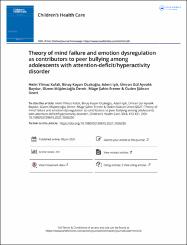Theory of mind failure and emotion dysregulation as contributors to peer bullying among adolescents with attention-deficit/hyperactivity disorder

Göster/
Tarih
2021Yazar
Yılmaz Kafalı, HelinKayan Ocakoğlu, Binay
Işık, Adem
Ayvalık Baydur, Ümran Gül
Müjdecioğlu Demir, Gizem
Şahin Erener, Müge
Üneri, Özden Şükran
Üst veri
Tüm öğe kaydını gösterÖzet
This study investigated whether poor performance in the
Reading the Mind in the Eyes Test (RMET) and emotion dysregulation (ED) contributes to involvement in bullying among
adolescents with attention-deficit/hyperactivity disorder
(ADHD). Altogether, 105 adolescents with ADHD aged
10–18 years (mean: 13.9±1.8 years, 77% boys) were recruited.
RMET was applied to evaluate the ToM abilities. Participants
completed the Difficulties in Emotion Regulation Scale (DERS)
and the Olweus Bully/Victim Questionnaire to measure ED and
evaluate involvement in bullying, respectively. Among the subjects, 24.8% were victims, 23.8% were perpetrators. The perpetrators and victims exhibited significantly lower RMET scores
and higher DERS awareness scores than non-victims/nonperpetrators. The perpetrators also exhibited significantly
higher DERS impulse scores and DERS total scores than nonvictims/non-perpetrators. Binary logistic regression analysis
revealed that a 1-point decrease in the RMET score increased
the odds of bullying victimization by 53% and bullying perpetration by 21.6%, while a 1-point increase in DERS impulse
scores increased the risk of bullying perpetration by 14.9%.
This study is the first to show an association between poor
ToM ability and involvement in bullying as victims/perpetrators
among children with ADHD. Both victims and perpetrators had
problems with emotional awareness, while only perpetrators
had difficulties controlling their impulses.
Cilt
50Sayı
4Bağlantı
https://hdl.handle.net/11363/5112Koleksiyonlar
Aşağıdaki lisans dosyası bu öğe ile ilişkilidir:

















